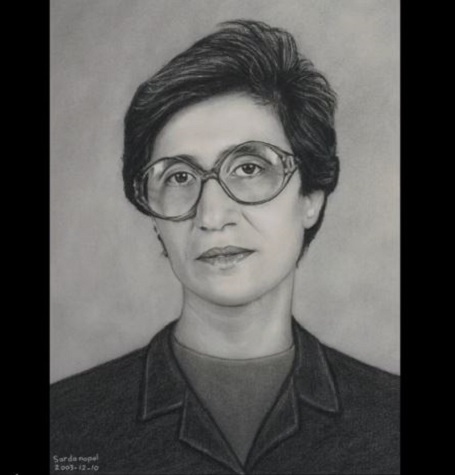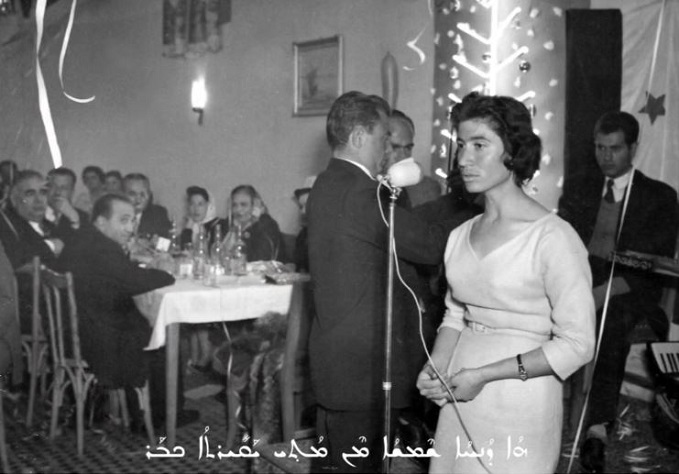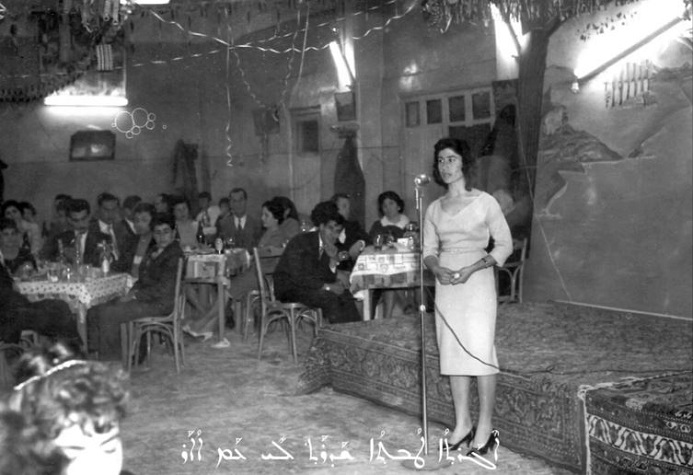Evlin Dawud: The Nightingale of Syriac National Songs
A series about influential Syriacs in the modern history of Syria
In an era when Syriac national songs were a vibrant expression of identity and belonging, Evlin Dawud emerged as a pioneering female voice, carrying the torch of committed art that blended patriotic fervor with tender romanticism. Her legacy was not only defined by her melodious voice but also by her unwavering dedication and lifelong struggle to revive Syriac heritage and foster her people’s sense of identity. Evlin, who lived from 1935 to 2003, left behind a rich legacy that continues to resonate in the hearts of Syriacs in their homeland and diaspora.
Early Life and Discovery of Talent
Born in Zahle, Lebanon, in 1935, Evlin Dawud soon moved with her family to Zalin (Qamishli) in Syria, where she grew up immersed in the sacred melodies of church hymns that shaped her early musical consciousness. In this vibrant Syriac city, her exceptional talent was discovered by the renowned chanter Malfono Youssef Shamoun, who encouraged her to pursue national and ecclesiastical singing. The 1930s, 1940s, and 1950s marked a cultural renaissance for the Syriac community in Zalin, with luminaries like composer Gabriel Asaad, who crafted timeless anthems such as “Ho Donho Shemsho” (‘See, the Sun Rises’) in 1933, and poet Naoum Faiq, whose verses nurtured Syriac identity.
Pioneering Syriac National Songs
Evlin devoted her life to Syriac national songs, which carried messages of love for homeland and history. She performed compositions by eminent musicians like Father Paul Michael Koli, who accompanied her on the accordion in numerous recordings, and Elias Boyaji. Among her most notable anthems are “Ahay Clayme” and “Fros Lishono d’Abohayk,” with lyrics penned by literary figures such as Malfono Augin Manofar and Malfono Yuhanon Salman, Evlin’s uncle. These works played a pivotal role in igniting national consciousness, particularly in Syria’s northeastern Gozarto (Jazeera) region, where institutions like the Rafidain Club, the Syriac Scout Movement, and the Rahmat Ito w’Lishono Association served as platforms for reinforcing identity.
One of her standout achievements was the 1951 recording of “Ahay Clayme Bnayo d’Umtho d’Suryoyutho,” with lyrics by Monk Afram Aboudi and music by Father Paul Michael, later re-recorded by the Mar Afram Syriac Choir in Holeb (Aleppo). This song, among others, gained widespread acclaim among Syriacs, kindling pride in their history and love for their nation.

Cultural and Social Contributions
Evlin’s contributions extended far beyond singing, as she became a cornerstone of the Syriac community in Zalin (Qamishli). She worked in school education, trained choirs, served as a guide in the Syriac Scout Movement, and was a lead chanter at the Rafidain Club. She participated in numerous cultural events, including the Syriac Scout Festival in Holeb in 1956, where her voice fostered a sense of collective spirit. Often performing alongside chanters like Malfono Youssef Shamoun and Malfonitho Su’ad Youssef Elio, she brought diversity and creativity to her performances.
A Lasting Legacy
Evlin Dawud passed away in 2003, but her anthems remain alive in the collective memory, echoing in Syriac gatherings worldwide. Her legacy transcends her enchanting voice, encompassing her role as a cultural advocate who safeguarded Syriac identity during challenging times. She was a symbol of creativity and commitment, and her musical repertoire remains a treasure that narrates the story of a nation deeply rooted in its heritage.
Evlin Dawud was more than a chanter; she was the voice of a nation, the pulse of an identity, and a bridge between a storied past and a promising future. Her songs, imbued with the essence of history and the hope of tomorrow, will remain immortal, reminding us that true art is that which revives the spirit and unites hearts.

In this series
Farid Elias Nazha: Pioneer of Syriac Journalism and Champion of Syriac Nationalism
Shabo Bahé: A Beacon of Syriac Literature and Nationalism
Abrohom Nuro: A Journey of Devotion to the Syriac Language and Heritage
Gabriel Asaad: Pioneer of Syriac Music and Voice of Identity
A Voice Unsilenced: The Journey of Saeed Malki
The Light of the Gozarto: The Epic of Joseph Bahdi Keryo
Mayada Bselis: The Authentic Syriac Voice and Pioneer of Syrian Art
Selim Hanna: The Journey of a Syrian Syriac Artist in the World of Theater and Drama
Iskander Aziz: An Icon of Syrian and Syriac Art
Nouri Iskandar: Ambassador of Syriac Eastern Music and Chronicler of Its Heritage
The Syriac Asfar-Najjar Family: pioneers of Syrian agriculture in a journey through time
Youssef Abdelké: A Visionary Syriac Artist Blending Creativity and Commitment
Yaqub Keryo: The Syriac Journalist and Thinker Who Carried the Torch of Nationalism and Culture
Saeed Ishaq: The Silent Statesman Who Left His Mark on History
The Saga of Bahdi Keryo: A Leader Forged in Fire
Hanna Yaqub Abdulki (1877-1955): The Life of a Man Who Shaped History






















